Online Extras
End of the World Slideshow

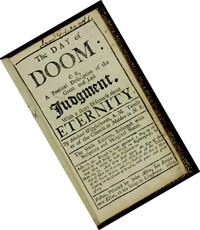
Beinecke Library, Yale
Wigglesworth’s tract on Judgment Day ends with a “short Discourse about Eternity,” having little to say, it seems, about forever.
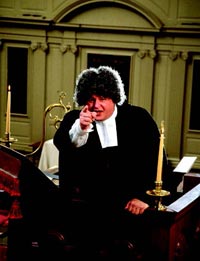
Dave Doody
Interpreter Charlie Redd as evangelist George Whitefield threatens the final payment due on the wages of sin.
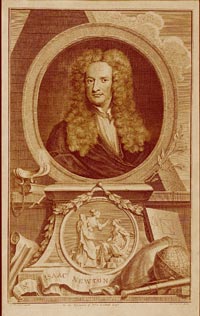
Barbara Lombardi
Sir Isaac Newton dismissed contemporary beliefs that the world was about to end. It would not happen, he said, till 2060.
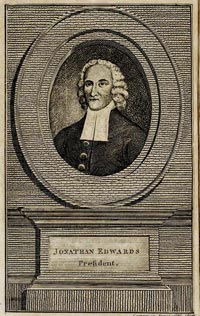
Beinecke Library
A force behind the Great Awakening, Jonathan Edwards stirred a religious fervor that embraced apocalyptic prophecy.
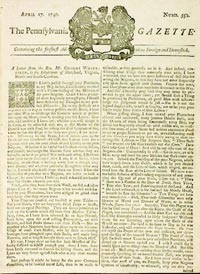
Colonial Williamsburg
George Whitefield cautioned readers against ignoring the eventual but certain judgment of God on man’s misdeeds.
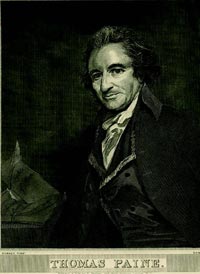
Library of Congress
Tom Paine hailed the coming Revolution as a chance to begin the world again, a political analogue to religious millennialism.
Eighteenth-Century Millennialism
To “start the world over again,” politics and religion intertwined
by James Breig
The business of the Fifth Continental Congress, meeting in Annapolis, Maryland, occupied Thomas Jefferson on December 11, 1783. Three months earlier, Great Britain and the United States had signed the Treaty of Paris to end the Revolutionary War, and legislators were grappling with war debts that had to be paid and states that did not show up for votes. Taking time from the pressing issues before him, Jefferson penned a consoling letter to his frightened eleven-year-old daughter, Martha, nicknamed Patsy. In her father’s absence, Mrs. Thomas Hopkinson watched over her, the girl’s mother having died a year before. Concerned about Patsy’s fretting over reports that the world was about to end, Jefferson wrote: “I hope you will have good sense enough to disregard those foolish predictions that the world is to be at an end soon. The Almighty has never made known to anybody at what time He created it; nor will He tell anybody when He will put an end to it, if He ever means to do it.”
Jefferson could have written similar letters to other people in the 1700s. As in the twenty-first century, when self-anointed prophets, radio talk-show hosts, and ex–vice presidents predict the approach of The End, repeated warnings that the apocalypse was at hand fascinated people in the seventeenth and the eighteenth. Perry Miller, a Harvard University professor, wrote in the William and Mary Quarterly that Isaac Newton “suffered a mysterious psychic depression” in 1693 and occupied his time “with an intensive study of the books of Daniel and of Revelation. . . . He wanted to find out how close he was to the end of the world!”
At Matthew 24:35–36, the Gospels report Jesus said: “Heaven and earth shall pass away. . . . But of that day and hour knoweth no man, no, not the angels of heaven, but my Father only.” That caveat didn’t stop an Italian cardinal from giving 1704 as the final year. Jacques Bernoulli, the Swiss mathematician, worked out that it would happen May 19, 1719. Emanuel Swedenborg, the Swedish mystic and scientist, foresaw 1757 as the end of all things. Charles Wesley, a founder of Methodism, and the Shakers ecumenically said that 1794 would mark the closeout of creation. Just as popular as the eighteenth-century belief in the end of the world was the notion that a watershed change would usher in the thousand years of the pre-millennium that would conclude with the return of Jesus and the launch the postmillennium. That distinction was lost on some people, according to Richard Kyle, a theologian who wrote Last Days Are Here Again: A History of the End Times. He said that “for much of the eighteenth century, there was a blurry indistinction between pre- and postmillennialism. Christians believed the Millennium was coming, but they were ambiguous about whether it was pre or post.”
Either way, millennialist tradition came early to America, entangling the religious longing for the return of Christ with the exploration of a new world where it might happen. In 1609, a tract by a London alderman said it was imperative to settle Virginia because “God hath reserved in this last age of the world, an infinite number of those lost and scattered sheepe, to be wonne and recovered by our means.” Similarly, wrote Ruth Bloch, a University of California at Los Angeles historian, “the Puritans who set out for ‘the wilderness’ that became New England believed that their actions would lead directly to the Millennium” and that “the church they would build was the biblical ‘woman in the wilderness’ pursued by the Beast,” as foreseen in the Book of Revelation.
As the Enlightenment and Christianity mingled in the 1700s, the notion of a coming epoch, religious, political, or both, flowered from seeds planted by Jonathan Edwards. Born in Connecticut in 1703, he sowed enthusiasm in religious revivals of the 1730s and ’40s that came to be known as the Great Awakening. Primarily centered in New England, the revivals encouraged emotional commitments to faith and exuberant public expressions of belief. Edwards died in 1758, but British evangelist George Whitefield, who preached in Williamsburg, stoked the fervor up to the eve of the American Revolution.
John Smith, a historian at Texas A&M University– Commerce, wrote:
The dominant millennialist theology of the eighteenth century was popularized by Edwards, who believed that human actions would bring about the Millennium, after which would happen the Second Coming and the final judgment. Edwards and the other . . . revivalists of the First Great Awakening believed that the extraordinary “outpouring of the Spirit” . . . heralded an imminent onset of the Millennium.
Nathan O. Hatch, in an article in the William and Mary Quarterly, wrote:
The great increase in seriousness, the new conviction of the truth of the gospel, and the unusual changes in young people throughout New England were convincing signs that God would soon transform the world into the “Latter-day Glory.” Edwards was so encouraged by the progress of piety that he announced that the Millennium would probably begin in America.
Casting about for an explosive American event that might trigger the Millennium, some thinkers, scholars, and divines seized on the brewing American Revolution. Nancy Koester, in her article “The Future of Our Past: Post- Millennialism in American Protestantism,” wrote that, by 1758, the year Edwards died,
A vision that linked God’s future ever more closely with politics was growing in America. . . . By 1765, the year of the infamous Stamp Act, New England pulpit rhetoric against tyranny was already in place and had only to be re-deployed against Britain. Taxation without representation was of the devil, and liberty . . . had become sacred.
While evangelists trumpeted a religious interpretation of a coming era, secular forces saw the events of the revolutionary era as a hinge on which history might swing. Historian Patricia U. Bonomi has written:
No doubt millennial expectations and evangelical preaching helped to move a good many Americans into the patriot camp. But by 1775– 1776 the emotionalism of the Great Awakening had subsided or been diluted by a widening current of Enlightenment rationalism. Thus evangelical Calvinism and religious rationalism did not carve separate channels but flowed as one stream toward the crisis of 1776.
As Bonomi notes, dividing Americans during that period into those who were religious but apart from politics and those who were rationalists but uninterested in theology ignores the reality of a time when such disciplines regularly intermingled Newton is an example; another is Joseph Priestly, a British theologian and experimenter with electricity, as well as a friend of Richard Price, a preacher. In his book about them, Jack Fruchtman Jr. wrote that “Priestly thought of human events as providentially controlled by cosmic forces that eternally stimulated human beings to work to fulfill the prophecies of God’s future universal, though earthly, paradise,” which was termed the Millennium. Fruchtman also wrote, “Anything that compromised men’s quest for liberty or tarnished civic virtue cosmically detracted from progress toward the millennial moment. . . . Price was to note in 1784 that the significance of the American Revolution was such that it portended the last age of the world.”
Smith said:
The millennialism of the revolutionary era was essentially divided between the secular variety and the post-millennial variety. Many of the Founders believed that they were—in Thomas Paine’s language—beginning the world anew with the Revolution, while the more religious believed that the War for Independence might herald the Millennium preceding Christ’s return. . . . The Founders who believed that their actions would spark the Millennium didn’t think that it would unfold literally, as predicted in the New Testament.
Rather, “they thought their actions conformed to a divine timetable.”
The Paine quotation—“We have it in our power to begin the world over again”—appeared in his pamphlet Common Sense. He wrote, “A situation, similar to the present, hath not happened since the days of Noah till now. The birthday of a new world is at hand.” In an article titled “A Note on Common Sense and Christian Eschatology,” Stephen Newman, a professor at Cornell University, linked the cause of liberty and the end times:
Just as the great flood had washed away all corruption and given mankind the chance to start over again, so now independence offered the colonists an opportunity to “begin government at the right end.” But this is no mere analogy; Paine had placed independence within the scheme of sacred history as an apocalyptic return to republican government under divine sanction.
As ardent as Paine was, Smith said John Adams was:
chief among those Founders who looked upon the Revolution in apocalyptic terms, but not in any literal biblical or even specifically Christian way. Nevertheless, in his 1765 “Dissertation on the Canon and Feudal Law,” he contended that the British colonization of America was “the opening of a grand scene and design in Providence for the illumination of the ignorant, and the emancipation of the slavish part of mankind all over the earth.”
Adams understood the Revolution as “a necessary next step in that process,” Smith said. “When the British surrendered at Yorktown, Adams enthused in a letter to his wife, Abigail, that ‘the great designs of Providence must be accomplished. Great indeed! The progress of society will be accelerated by centuries by this revolution.’”
Kyle said, “A lot of people viewed the war as apocalyptic. On the popular level, that provided some meaning to the struggle and an explanation for the suffering. Some people saw George III as the anti-Christ and the war as a holy crusade.”
Thomas S. Kidd, from the Institute for Studies of Religion at Baylor University, wrote:
The general tendency among the major Founders was to see the Revolution as the work of Providence for the protection and expansion of human liberty. Not many patriots believed that the Revolution would lead imminently to the end of the world. Even evangelical Christians believed that the end would be preceded by massive revivals of religion, and probably the destruction of the political power of Roman Catholicism and the Ottoman Empire. Nevertheless, some Americans believed that the American Revolution was an “important step towards bringing in the glory of the latter day,” . . . certainly a belief that God was using the Revolution for a greater purpose: to help usher in the last days.
In the William and Mary Quarterly, Melvin B. Endy Jr. said that by the 1770s “religious leaders were incorporating political developments into their salvation history and urging people to regard the Revolution as a holy war between the forces of Christ and Antichrist to bring about the Millennium.” One such religious leader said, as the colonies edged toward revolution,
God Almighty, with all the powers of heaven, are on our side. Great numbers of angels, no doubt, are encamping “round our coast,” for our defense and protection. Michael stands ready, with all the artillery of heaven, to encounter the dragon, and to vanquish this black host.
Hatch said:
Sermons during the war stressed repeatedly that American liberty was God’s cause, that British tyranny was antichrist’s, and that sin was failure to fight the British. With the coming of peace many ministers envisioned Christ’s thousand year reign on earth as an extension of the civil and religious liberty established in America.
Hatch said “this amalgam of traditional Puritan apocalyptic rhetoric and eighteenth century political discourse” was a “civil millennialism” that derived from Edwards’s preaching.
That the world did not end during the eighteenth- century would not have surprised calculating Newton. When the preeminent mathematician of his age concentrated his considerable mind on dating when creation would conclude, in order “to put a stop to the rash conjectures of fanciful men,” he reckoned the date would be after 2060.
Had Jefferson heard that conclusion, he might have been skeptical. Ever a theist, he addressed the subject in an 1825 letter, revisiting the topic he had once written to his daughter about. He said, “It is between fifty and sixty years since I read” the “Book of the Apocalypse,”
And I then considered it as merely the ravings of a maniac no more worthy nor capable of explanation than the incoherences of our own nightly dreams. . . . There is not coherence enough in them to countenance any suite of rational ideas. . . . I do not consider them as revelations of the Supreme Being whom I would not so far blaspheme as to impute to Him a pretension of revelation couched at the same time in terms which He would know were never to be understood by those to whom they were addressed.
James Breig contributed “Volumes of Knowledge: How the Enlightenment Perfected the Encyclopedia” to the summer 2012 journal. He writes from near Albany, New York.
Suggestions for further reading:
- Ruth Bloch, Visionary Republic: Millennial Themes in American Thought 1756–1800.Cambridge, 1985).
- Patricia U. Bonomi, Under the Cope of Heaven: Religion, Society, and Politics in Colonial America (New York, 1986).
- Jack Fruchtman Jr., The Apocalyptic Politics of Richard Price and Joseph Priestly (Philadelphia, 1983).
- Richard Kyle, The Last Days Are Here Again: A History of the End Times (Grand Rapids, MI, 1998).
